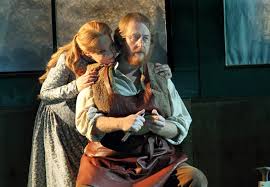ENO, 7 February 2015
Wagner’s The Mastersingers of Nuremberg has long had a special place in the heart not only of ENO audiences but also of the company itself. It was Mastersingers that first brought the Sadlers and Wells companies together in the mid-sixties for the first time and launched the series of Wagner performances under Reginald Goodall which in many ways created the company we know today.
Despite the rumbles we hear of behind the scenes, the standards that were set back then are more than obvious is this most recent production under Edward Gardner and Richard Jones.
First seen over five years ago at WNO, the production seems lighter now, more subtle both in its characterisation and musical weight. The drama unfolds swiftly and inevitably, with constant concentration on the text and the interaction of character. Not that this should in any way imply that there is a problem with the musical standards. This is one of the finest sung and played performances I can recall with all parts drawn from strength; but Wagner himself intended that the text should lead the hearer not simply the beauty of the musical line, and it does so with sharp clarity. It is one of the few times where having the surtitles in addition to the opera being sung in English really pays off.
Given that everything in Mastersingers hangs on the quality of the Prize Song Gwyn Hughes Jones’ Walter is totally convincing. His Now begin in Act One gave us a hint of what was to come but few Walter’s have the stamina to carry this level through to the end. No problems here; the Prize Song came over as fresh and lyrically mellifluous, a truly convincing winner.
The relationship between Sachs and Beckmesser is also a surprisingly subtle one. It is quite clear that they are close and that the upset is an aberration in their friendship, which, one suspects, will be quickly healed. Iain Paterson’s jovial Sachs is confused by his feelings for Eva and his quiet tear in act three is one of a number of gentle indications of his depths of feeling for her. Andrew Shore’s Beckmesser may be a stickler for regulation but he is a more complex and likeable character than is frequently the case. James Creswell is a noble Pogner and Rachel Nicholls shines as Eva – but as already noted there are no weaknesses in the casting.
The final scene, and in particular Sachs’ narration can be a stumbling block for producers today but Richard Jones circumvents this by letting the whole cast step out of character to point us, as the front cloth does, to the importance of German art and thinking, which Wagner himself intended.
With so much quality on stage it would be easy to overlook the importance to the whole of Edward Gardner’s deft handling from the pit and the enthusiastic brilliance of the choral singing.
How anybody could even think of seriously criticising a company that can create productions of this quality is – well – Mad!

